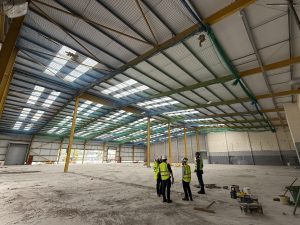Tech sector sees fall in venture funding

The South West’s largest tech network has published its inaugural chair’s report outlining the state of play in the region.
The inaugural report from techSpark celebrates the recent achievements of those within the cluster, which now features over 1,200 businesses across the likes of fintech, greentech, digital, cyber and deeptech.
The report also delves into how the cluster could be improved, as both Bristol and Bath are beginning to feel the growing pains of ecosystem maturity.
It highlights policymaking and political leadership, the diversity and depth of investment and venture capital funding as well as the need to build upon the collaborative culture, cementing the cluster’s identity and bridging the gaps between competition and collaboration as some of the key areas to assess.
Regional identity is one of the major strengths of the two cities. But also, the source of its greatest potential weakness – according to techSPARK chair, Nick Sturge.
He said: “Bristol and Bath are passionate cities, with purpose at their hearts. But the often-cited humility of those within the tech space, may in fact be hampering growth. The level of humbleness within the space seems to be at odds with global brand building and big acquisition routes. What do we want to be known for?”
When it comes to acquisition and investment, the report highlights that the two cities are seeing less venture funding being deployed in 2023, particularly at pre-seed and early-stage levels.
Though Bristol and Bath are still seeing strong equity investment levels, with a total of £975m raised in 2022.
In the past, Bristol was cited as the strongest cluster in the UK outside London for the availability of growth capital. In 2021 Atomico reported Bristol was third in Britain behind London, Birmingham and Manchester. The city went on to drop out of Atomico’s top 20 European rankings in 2022.
This picture is compounded by the recent success of other UK regions, in receiving government funding via innovation accelerators and investment zones.
The funding itself has been distributed in line with the levelling-up agenda. But while this will de-risk and unlock additional private and public sector funding, it could see Bristol and Bath struggle to keep pace over the next five years if we choose to measure ourselves as such.
Positioning the cluster politically to ensure policy is well positioned to support the tech sector is also cited. The efforts of the region’s research institutes have led to a growth in the number of spin-outs, when compared nationally, with all four local universities offering great strengths and benefits to the sector.
However, political leadership and political interest was one of the most widely raised topics, during the consultation and creation of the report.
Sturge added: “During the consultation for this report, the lack of political interest in the sector and poor leadership frequently emerged. The consensus is that political leaders don’t fully comprehend or champion the sector in a way that leaders in other clusters, like the Midlands and Manchester, do.
“It was noted, by those we consulted, how the West of England Combined Authority has grown in size in recent years making it appear harder to influence strategy and priorities. This leaves a sense that public and private sectors aren’t pulling in the same direction nor championing the sector on the national stage. techSPARK has been able to engage with officers at the Authority and so this report gives us an opportunity to push for ambitious and innovative new approaches”
The report highly praises the human capital within the cluster. A highly skilled workforce with strong mentorship and governance are key strengths of the sector. A positive and forward-thinking incubator mentality is also greatly contributing towards overall health.
However, concerns have been raised over the risk of entrepreneur drain, leading to a limited community of more experienced entrepreneurs and a reduced appetite for individuals taking on ‘higher risk’ jobs.
The cost-of-living concern also looms large, with Bristol now being named as the most expensive major city to live in outside of London, as the city becomes less affordable to live in, could limit the local talent pool, diversity and social mobility.









